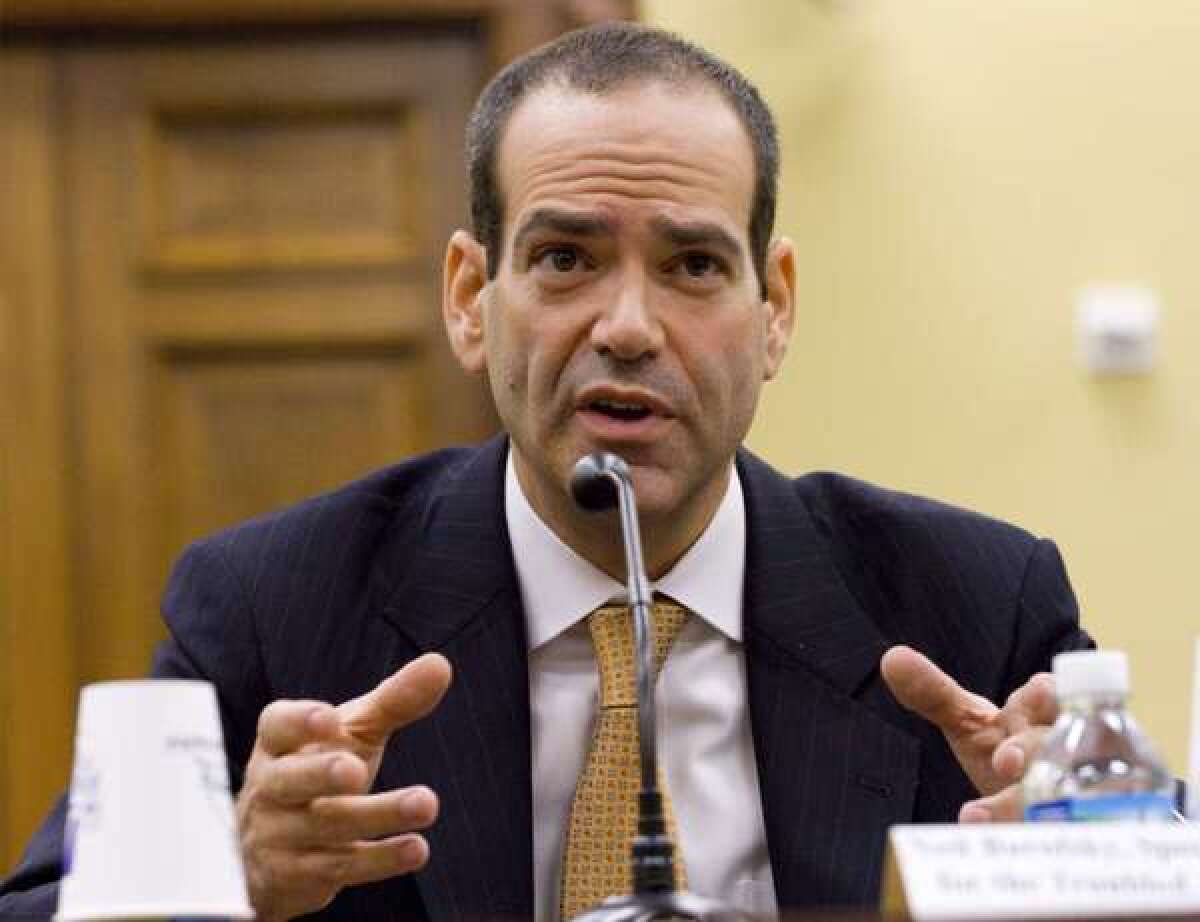CashCall, the ex-regulator and the revolving door

- Share via
One fascinating aspect of a federal regulator’s lawsuit this week against online lender CashCall for making allegedly illegal collections from borrowers is the identity of CashCall’s defense lawyer.
He’s Neil Barofsky, the former federal prosecutor and government watchdog who made his name fighting for consumers and taxpayers victimized by fraudulent banking activities.
Barofsky’s career track included stints as a federal prosecutor in New York and as special inspector general for TARP, the federal banking bailout. In the latter job he became a scourge of Treasury officials he thought were handing over taxpayer funds to bankers without much concern about the effectiveness of the bailout. After leaving Washington he taught at New York University law school and wrote “Bailout,” a 2012 book turning a gimlet eye on the banking regulators’ poor record.
When Barofsky joined the big law firm Jenner & Block in September, there was talk that at least here was a former regulator who was at least staying on the right side of the public interest in moving to the private sector -- keeping clear of the revolving door, so to speak.
Jenner & Block was known for representing clients against the big banks, rather than representing the big banks themselves. Barofsky “appears to be taking a different tack from other regulators or top law enforcement officials who join firms that defend the same institutions they previously oversaw or policed,” reported Gretchen Morgenson in the New York Times.
Yet here he is, defending a company that was servicing loans to low-income borrowers costing them annualized interest rates as high as 343%. That’s the type of turnaround that makes you go “hmmm.”
Or is it? “I’ve made my professional career representing the underdog,” Barofsky told me Tuesday. He said defending CashCall in this case is “consistent with what I’ve been doing in my career, and it doesn’t give me any pause.”
So let’s take a harder look, starting with the case against CashCall. The lawsuit filed against the Anaheim-based company by the Consumer Financial Protection Bureau parallels cases brought by several states, which say that the underlying loans carried high interest rates in violation of their state usury limits. That made the loans unenforceable and uncollectable by CashCall, the servicing agent. Nevertheless, CashCall continued to collect, pursuing delinquent borrowers with the usual arsenal of phone calls and importuning letters.
Hundreds of thousands of loans were made from 2010 to September 2013, often for sums of less than $10,000, sometimes for a few hundred bucks. They were payable over as much as seven years. One $2,600 loan mentioned in the CFPB complaint carried an annual rate of 139%, which meant the borrower would repay a total of $13,840 over four years.
CashCall’s defense is that the loans were actually made by a lender named Western Sky Financial, which is owned by a member of the Cheyenne River Sioux Indian tribe and located on its South Dakota reservation. That makes the loans exempt from the state laws, the companies maintain. The states and the federal government say Western Sky’s location and ownership don’t matter: The loans were illegal.
Barofsky makes a distinction between the CashCall loans and the sort of predatory lending he used to go after as a federal prosecutor. The latter category includes payday loans which are typically for short periods, carry huge interest rates, but are rolled over again and again, condemning their borrowers to permanent indenture to the banks. And some payday lenders are owned by the big banks that got federal bailouts, including Wells Fargo.
By contrast, Barofsky says, people borrowing from CashCall knew exactly what they were getting into -- the loans were “fully transparent and definitively non-predatory, notwithstanding the high interest rate.”
He also argues that the CFPB has no business in this case. That’s because the lawsuit amounts to trying to regulate interest rates, which the bureau is specifically forbidden to do. The CFPB tries to get around that restriction by asserting that it’s merely going after CashCall for trying to collect loans whose interest rates already have been judged illegal by the states, but Barofsky and his co-counsel, Katya Jestin, say they’ll challenge its jurisdiction in court.
In sum, Barofsky argues that he’s still defending the underdog. In this case the prime victim is Western Sky, which he labels a “small business” whose workers have lost their jobs because of the state and federal actions. He says he’s merely “standing up for these companies that were engaged in legal activity.”
Perhaps so, but that defense sounds a bit, shall we say, lawyerly. The assertions in the state and federal cases against Western Sky and CashCall suggest they targeted a vulnerable population with loans pegged to unconscionable interest rates.
You can say that the rates on the loans, which were unsecured, fairly reflected the borrowers’ credit standing. But you’d also have to concede that lending money to people at interest rates of 90% to 343% per annum isn’t likely to improve their financial condition or set them on the road to financial survival. Sure, they’ll have cash in the short term that perhaps they desperately need, but the hangover is enormous. Aren’t these the people Neil Barofsky used to look out for?
More to Read
Inside the business of entertainment
The Wide Shot brings you news, analysis and insights on everything from streaming wars to production — and what it all means for the future.
You may occasionally receive promotional content from the Los Angeles Times.











